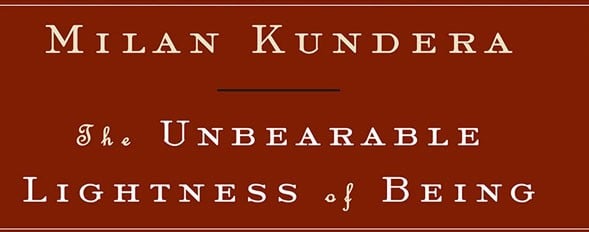
‘The Unbearable Lightness of Being’ is a novel that I have gone back to time and again, wept and laughed with

A Czech writer writes in his mother tongue; French and English translations follow. Decades later, I walk aimlessly into a bookstore and commit the cardinal sin of judging a book by its cover.
Fate - Es muss sein? (It must be)
The next thing I know, I am suffering the sweetest agony at the hands of a paperback -- slipping into quiet contemplation, walking around in a daze, having the ultimate (existential) itch scratched. The Unbearable Lightness of Being by Milan Kundera came as not just a book but a wise old friend full of profound observations. The kind that you imagine separating the wheat from the chaff with a natural flair, disentangling the questions of life in a clever way using analogies, anecdotes and the work of intelligent and noteworthy men while you freeze in your seat completely awestruck… The kind that breaks into a wide, toothy grin when he sees your reaction…
"What then shall we choose? Weight or lightness?" he asks at various points.
"When we want to give expression to a dramatic situation in our lives, we tend to use metaphors of heaviness. We say that something has become a great burden to us. We either bear the burden or fail and go down with it, we struggle with it, win or lose," he explains.
The way he tells the story -- rhythmically going backwards and forwards as he thinks out loud, makes for a gripping and natural conversation. To add to this, the novel showcases a deep understanding of human nature, an appreciation of the multiple layers of personality and a remarkable sensitivity. This is obvious in the way he treats the aspirations, fears and dilemmas of the characters which is both astonishing and touching.
The plot unfolds at a steady pace. Chance brings Tomas and Tereza together -- he is a surgeon sent as an eleventh hour replacement to the town and she happens to be a waitress at the hotel that he is staying at. Tereza leaves everything behind to join Tomas later in Prague and the two fall in love. Tomas’ dilemma grows as he is torn between Tereza and his mistress -- the artist Sabina who is also having an affair with a married university professor, Franz.
Read also: A surge within that took over
Initially, Sabina and Tomas represent lightness and Tereza represents heaviness. It is neatly laid out for the reader but as the characters deal with the totalising nature of kitsch, the aesthetic ideal that reigns supreme in the realm of politics as well as human life, the chaos in their lives is amplified.
The novel then posits a pertinent question, perhaps the most pertinent question concerning existence. Should life be taken seriously or not? Should it be heavy or light? In a world where Nietzsche’s concept of eternal recurrence (the notion that everything that has already happened will recur ad infinitum) does not hold true, should we be labouring to give life meaning? Kundera has a sense of humor about an otherwise horrifying question.
It was because of his lyrical writing and dark humour that I read on hungrily, trying to find out what side my old wise friend would pick, what ending he would give to his characters. After a great deal of contemplation, I too came to the bittersweet conclusion that our lives are ultimately light.
In a larger sense, to struggle to give life meaning that is objective in nature would be futile -- if we live once, we might as well not have lived at all. Einmal ist keinmal. Yet, we cannot escape the weight that our actions carry in the moment and perhaps, this is the closest we come to feeling a sense of fulfillment. Like those of Kundera’s characters in the novel that die with a sense of fulfillment and peace, we must attempt to embrace the idea that love -- even if it is a fleeting emotion in a post-modern world, makes the journey of life slightly bearable -- but that in the end, nothing really matters. That is all the consolation that life can afford.
What more should I say about a novel that I have gone back to time and again, wept and laughed with, furiously memorised, one that looks at the binaries in life not to moralise or denounce one in favour of another but for what they are? The soul and the body, darkness and light, strength and weakness, fidelity and betrayal, heaviness and lightness…
Kafka once said that a book must be an axe for the frozen sea inside of us and this is precisely what the novel was for me. It was like a long overdue chat with someone who, if did not have the answers, was at least asking the right questions. It appears to be a bit of a self-indulgent and narcissistic venture in retrospect -- looking for exactly what I wanted to hear and finding that articulated and endorsed by a widely celebrated author.
Reading literature, in a sense, gives us a feeling of belongingness and acceptance. For some odd reason, we are amused by the fact that our dilemmas and challenges aren’t as unique as we would like them to be. We gasp in surprise as the author finds a raw nerve, offers reassurance and gives words to complex and raw emotions. Underneath the façade of uniqueness and control, we are more similar and torn than we would like to admit.
"On the surface, an intelligible lie; underneath, the unintelligible truth," reckons Kundera.
I am still reeling from the impact.